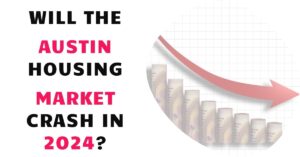The Austin housing market has been one of the hottest in the nation for several years, with soaring home prices, low inventory, and high demand. However, signs of cooling emerged last year, as more homes hit the market, sales declined, and prices softened. Does this mean that the Austin housing market is headed for a crash in 2024?
There is no consensus among experts on whether the Austin housing market will crash in 2024. Some experts believe that the market is overheated and could be due for a correction, while others believe that the strong fundamentals of the Austin economy will support continued price growth.
A crash implies a sudden and severe drop in home prices and sales volume, usually triggered by a major economic shock or a systemic failure in the housing sector. However, none of these factors are present or expected in the near future for Austin. On the contrary, Austin has a strong and diversified economy that continues to attract businesses and workers from other parts of the country and the world.
Austin ranks as the No. 1 city to live in Texas according to a recent report by U.S. News & World Report. It ranks 13 on a list of the fastest-growing places in the U.S. According to MoneyGeek, Austin ranked no. 6 for job seekers in 2023, based on multiple factors including growth in employment during the last 12 months and three years and growth in hourly wages. It ranked at no. 2 in the list of best cities for Gen Z job seekers.
Factors that could lead to Austin Housing Market Crash:
- Rising interest rates: As mortgage rates rise, it becomes more expensive to borrow money to buy a home, which could lead to a decline in demand and home prices.
- Overbuilding: If too many new homes are built in Austin, it could lead to a glut of supply and a decline in prices.
- Economic recession: If the US economy enters a recession, it could lead to job losses and a decline in consumer confidence, which could also lead to a decline in home prices.
Factors that could support the market:
- Strong job growth: Austin is one of the fastest-growing cities in the US, and its strong job market is attracting new residents from all over the country. This is driving up demand for housing and supporting home prices.
- Limited supply: Austin has a limited supply of land available for development, which is also supporting home prices.
- Investment demand: Austin is a popular destination for investors, who are buying up homes to rent out or sell later for a profit. This is also driving up demand and home prices.
Latest trends in 2024:
- Home prices in Austin have been cooling off in recent months. According to the Austin Board of Realtors, the median sales price for homes in the Austin area stood at $450,000 in July 2024, showing a 2.8% decrease year-over-year.
- This slight dip in prices might offer some relief to buyers who have been facing steep competition and rising costs in recent years.
- The number of homes sold in Austin has also been declining. There were 2,652 homes sold in Austin in July, down 3.5% year-over-year.
- The average time it takes to sell a home in Austin has increased to 63 days, up 4 days from July 2023.
These trends suggest that the Austin housing market is stabilizing and becoming more favorable for buyers, who have more options to choose from and less pressure to make quick decisions or offer above the asking price. However, this does not mean that buyers can expect to find bargains or lowball sellers.
According to another data by Refin, the Austin housing market is still somewhat competitive, with homes selling for about 97.4% of their list price The average homes sell for about 3% below list price and go pending in around 55 days whereas hot listings can sell for around list price and go pending in around 31 days.
Moreover, not all segments of the market are experiencing the same dynamics. There is still a shortage of affordable housing options for first-time homebuyers or those looking for more budget-friendly homes.
The lower-priced homes tend to sell faster and receive more offers than the higher-priced ones. Therefore, buyers should work with experienced REALTORS® who can help them navigate the market and find the best opportunities for their needs and budget.
Overall, the Austin housing market is still strong, but it is showing signs of cooling off. It is not easy to say whether the market will crash in the future, but buyers and sellers should be aware of the potential risks and be prepared for changing market trends in this real estate market.
Also Read:
- Austin Real Estate Market Forecast 2025 to 2030
- Austin Housing Market: Prices, Trends, Forecast 2024-2025
- Is The Austin TX Housing Market in Big Trouble?
- Is the Austin Housing Market Shifting? Here's What Experts Say
- Austin House Prices Are ‘Going Back To Normal’
- Austin Housing Market is Losing Homebuyers to Other Cities



